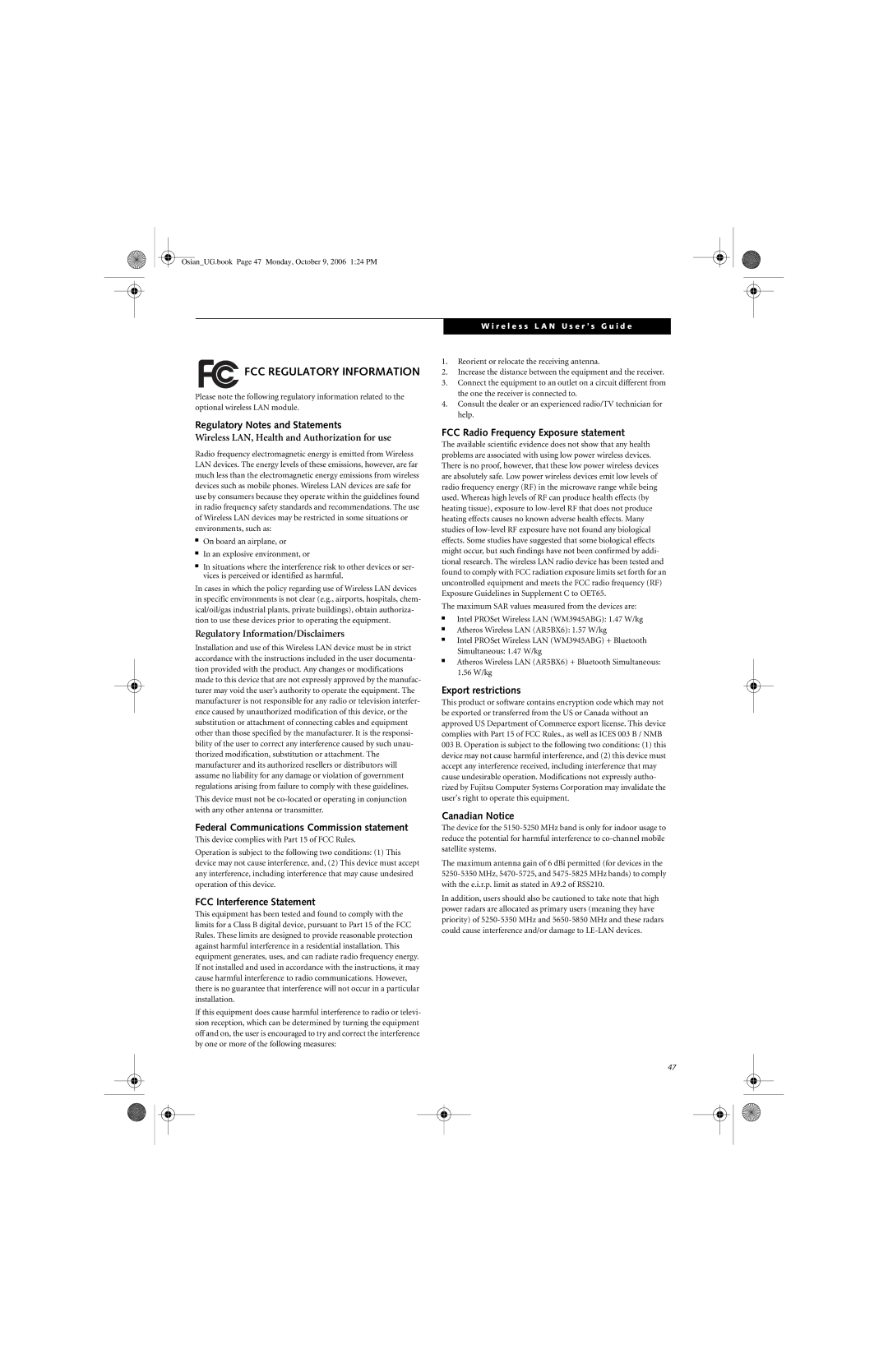
Osian_UG.book Page 47 Monday, October 9, 2006 1:24 PM
FCC REGULATORY INFORMATION
Please note the following regulatory information related to the optional wireless LAN module.
Regulatory Notes and Statements
Wireless LAN, Health and Authorization for use
Radio frequency electromagnetic energy is emitted from Wireless LAN devices. The energy levels of these emissions, however, are far much less than the electromagnetic energy emissions from wireless devices such as mobile phones. Wireless LAN devices are safe for use by consumers because they operate within the guidelines found in radio frequency safety standards and recommendations. The use of Wireless LAN devices may be restricted in some situations or environments, such as:
■On board an airplane, or
■In an explosive environment, or
■In situations where the interference risk to other devices or ser- vices is perceived or identified as harmful.
In cases in which the policy regarding use of Wireless LAN devices in specific environments is not clear (e.g., airports, hospitals, chem- ical/oil/gas industrial plants, private buildings), obtain authoriza- tion to use these devices prior to operating the equipment.
Regulatory Information/Disclaimers
Installation and use of this Wireless LAN device must be in strict accordance with the instructions included in the user documenta- tion provided with the product. Any changes or modifications made to this device that are not expressly approved by the manufac- turer may void the user’s authority to operate the equipment. The manufacturer is not responsible for any radio or television interfer- ence caused by unauthorized modification of this device, or the substitution or attachment of connecting cables and equipment other than those specified by the manufacturer. It is the responsi- bility of the user to correct any interference caused by such unau- thorized modification, substitution or attachment. The manufacturer and its authorized resellers or distributors will assume no liability for any damage or violation of government regulations arising from failure to comply with these guidelines.
This device must not be
Federal Communications Commission statement
This device complies with Part 15 of FCC Rules.
Operation is subject to the following two conditions: (1) This device may not cause interference, and, (2) This device must accept any interference, including interference that may cause undesired operation of this device.
FCC Interference Statement
This equipment has been tested and found to comply with the limits for a Class B digital device, pursuant to Part 15 of the FCC Rules. These limits are designed to provide reasonable protection against harmful interference in a residential installation. This equipment generates, uses, and can radiate radio frequency energy. If not installed and used in accordance with the instructions, it may cause harmful interference to radio communications. However, there is no guarantee that interference will not occur in a particular installation.
If this equipment does cause harmful interference to radio or televi- sion reception, which can be determined by turning the equipment off and on, the user is encouraged to try and correct the interference by one or more of the following measures:
W i r e l e s s L A N U s e r ’ s G u i d e
1.Reorient or relocate the receiving antenna.
2.Increase the distance between the equipment and the receiver.
3.Connect the equipment to an outlet on a circuit different from the one the receiver is connected to.
4.Consult the dealer or an experienced radio/TV technician for help.
FCC Radio Frequency Exposure statement
The available scientific evidence does not show that any health problems are associated with using low power wireless devices. There is no proof, however, that these low power wireless devices are absolutely safe. Low power wireless devices emit low levels of radio frequency energy (RF) in the microwave range while being used. Whereas high levels of RF can produce health effects (by heating tissue), exposure to
The maximum SAR values measured from the devices are:
■Intel PROSet Wireless LAN (WM3945ABG): 1.47 W/kg
■Atheros Wireless LAN (AR5BX6): 1.57 W/kg
■Intel PROSet Wireless LAN (WM3945ABG) + Bluetooth Simultaneous: 1.47 W/kg
■Atheros Wireless LAN (AR5BX6) + Bluetooth Simultaneous:
1.56W/kg
Export restrictions
This product or software contains encryption code which may not be exported or transferred from the US or Canada without an approved US Department of Commerce export license. This device complies with Part 15 of FCC Rules., as well as ICES 003 B / NMB 003 B. Operation is subject to the following two conditions: (1) this device may not cause harmful interference, and (2) this device must accept any interference received, including interference that may cause undesirable operation. Modifications not expressly autho- rized by Fujitsu Computer Systems Corporation may invalidate the user's right to operate this equipment.
Canadian Notice
The device for the
The maximum antenna gain of 6 dBi permitted (for devices in the
In addition, users should also be cautioned to take note that high power radars are allocated as primary users (meaning they have priority) of
47
